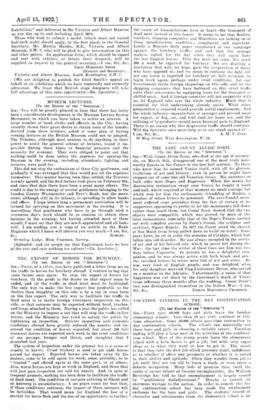THE EXPORT OF HORSES FOR BUTCHERY.
[To THE EDITOR OF THE " SPECTATOR.") SIR,—Twice, at a crisis, you have published a letter from me on the traffic in horses for butchery abroad. I venture to beg that same favour once again. To stop the export of horses for butchery, (1) the profit to the dealer on that export must be ended, and (2) the traffic in dead meat must be facilitated. The only way to make the live export less profitable to the dealers than slaughter on this side is by a tax in some form on the live export. The only way to facilitate the traffic in dead meat is to invite foreign veterinary inspection on this side, so that carcases may be exported without head, trachea, and lungs attached to them. During a year the public has called on the Ministry to impose a tax that will stop the traffic in live horses, and the Ministry has tried to satisfy the public by tightening up inspection. Stricter inspection and economic conditions abroad have greatly reduced the number and im- proved the condition of horses exported, but about 200 hitlf worn-out horses are exported each week to the cruel conditions of sea passage, hunger and thirst, and slaughter that I described last year.
The system of inspection under the present Act is a cause of cruelty to horses. Cruel trickery is used to get unfit horses passed for export. Rejected horses are taken away by the dealers, some to be sold again for work, some, probably, to be • " treated " and offered again at the same port, or at others. Also, worse horses are kept at work in England, and those that will just pass inspection are sold for export. And, in spite of frequent protests, nothing has been done to facilitate the traffic in dead meat. The condition of carcases arriving at Ghent and at Antwerp is unsatisfactory. I see grave cause for fear that, if these conditions continue, the import of those carcases will be forbidden. That would mean for England the loss of a market for horse flesh and the loss of an opportunity to further
the cause all humanitarians have at heart—the transport of dead meat instead of live beasts. It seems to me that dealers. butchers, shipping companies, and Ministries are looking on at these -unsatisfactory conditions, complacent and expectant. Lately a Brussels daily paper complained of our campaign against the butchery traffic, and said that the sausage makers sighed for the day when they will again have the live English horses. That day must not come. Nor must 200 a week be exported for butchery. We are drafting a resolution that will, we hope, gain the co-operation of •many who have opposed us, and we mean to continue the fight till not one horse is exported for butchery or, half worn-out, in begin work again, perhaps under cruel conditions. Let our Government invite foreign inspection on this side, and let the shipping companies that have battened on this cruel traffic salve their consciences by equipping boats for the transport of chilled meat. And if foreign countries will not co-operate with us, let England take over the whole industry. Much that is essential for that undertaking already exists. What other preparation is required would provide useful employment. And the whole industry—manufacture of sausages and pressed meat for export, of dog, cat, and fowl food for home use, and the utilising of by-products—would mean financial gain to England. There is no reason why this disgraceful traffic should continue. Will the Spectator. once more help us in our stand against it:— I am, Sir, &c., A. M. F. Cots. 89 May Street, West Kensington, W. 14.


































 Previous page
Previous page